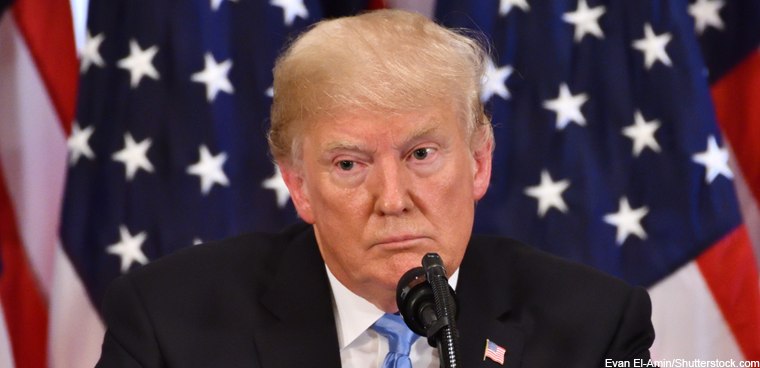Trump vetoes 2021 defense bill
The president has vetoed the Defense Department’s yearly authorization bill, which puts Congress in a scramble to repass it before the end of the congressional session.

President Donald Trump vetoed the 2021 defense policy bill for the first time during his presidency, putting the legislation needed to authorize troops’ hazard pay, military construction projects, money for cybersecurity, and other matters at risk of not being passed by the New Year.
The move comes after months of increasing tension between the White House and lawmakers over provisions included, such as the renaming of military installations and bases named for Confederate leaders, and not included, such as rolling back protections for social media companies in Section 230 of the Communications Decency Act, in the 2021 National Defense Authorization Act.
Trump cited 230 and the "renaming of certain military installations" (without naming the Confederacy) in a veto message transmitted to Congress mid-afternoon on Thursday, before his departure to his Florida residence for Christmas.
"Shamefully, this President believes that it is more important to honor defenders of slavery and segregation than it is to sign legislation paying our troops and keeping them safe," House Majority Leader Steny Hoyer (D-Md.), said in a statement.
Trump foreshadowed his veto plans on Dec. 17, tweeting: “I will Veto the Defense Bill, which will make China very unhappy. They love it. Must have Section 230 termination, protect our National Monuments and allow for removal of military from far away, and very unappreciative, lands. Thank you!”
The House has planned to meet for a Dec. 28 vote to override the veto and Senate Majority Leader Mitch McConnell (R-Ky.) cleared the calendar in case an override is necessary.
"The president's veto undermines our national security preparedness and jeopardizes the jobs of Americans who make up our defense industrial base at a time when the country is in crisis," Aerospace Industries Association President and CEO Eric Fanning said in a statement. "It is also a letdown for our troops and their families, both of who selflessly continue to serve our country. We urge Congress to prioritize national security and override this veto."
Both chambers passed the bill with numbers far above the quorum needed to override a presidential veto, 335-78 in the House and 84-13 in the Senate. But there's been lingering concern that Republican members who supported the bill on its initial passage will change their votes to show solidarity with the outgoing president.
"By choosing to veto the NDAA, President Trump has made it clear that does not care about the needs of our military personnel and their families," Rep. Adam Smith (D-Wash.), the chairman of the House Armed Services Committee, said in a statement. "If the FY21 NDAA does not become law, more than 100,000 federal employees will be deprived of the paid parental leave benefits they deserve, necessary military construction projects will not move forward on schedule and our service members who are in harm's way defending our country's principles will not have access to the hazard pay they are owed.
In addition to authorizing $740 billion in defense spending, the bill extends a parental leave benefit to federal employees not covered under Title 5, including many at the Transportation Security Administration and the Federal Aviation Administration.
Should the veto be sustained, it would be the first time the annual defense bill hasn't been passed in 60 years.
This story was updated Dec. 23 with additional details and comment.






